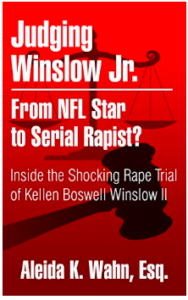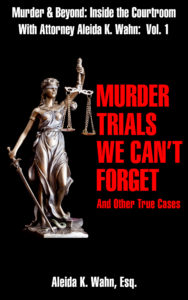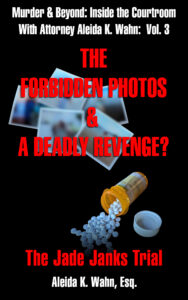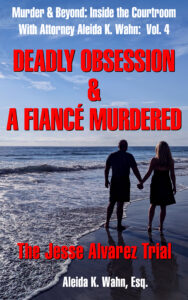
Without warning death fell on them from above. First there was an ear shattering bang, screeching, and then a pickup truck fell out of the sky, twisting midair as if in a movie, before nosediving into a vendor’s booth, crushing all life beneath it. It was 3:33 p.m. in the afternoon of October 15, 2016, and Richard Sepolio, a 24-year-old Navy petty officer had just crashed his GMC truck off the Coronado Bridge into Chicano Park, where thousands of people were enjoying a festive La Raza motorcycle rally on a beautiful San Diego day. One woman felt air pulling her backwards, her body seemingly paralyzed, and believed she was dying. Another was whirled around uncontrollably before ending up under a park bench. As the injured laid helpless among the panicked chaos, first responders were summoned from all sectors. Men on the ground raced to lift the truck, but nothing could save AnnaMarie and Cruz Contreras, Francine Jimenez, and Andre Banks. Their beautiful lives had ended.

Annamarie, 50, and her husband Cruz, 52, were known as “angels on this earth,” not only caring for their own three daughters but also taking in countless foster care children, mentoring troubled youth, and providing endless love to anyone in need. Francine Jimenez, 46, was described as always happy and was the light of her four children’s lives. Andre Banks, 49, was a man so loving, he never forgot to send a text message to his goddaughter each day. How could such goodness be gone?
And the devastation did not end there as seven other people were seriously injured, some even suffering life-threatening injuries. Jesse Gonzalez, Olivia Magana, Victor Garcia, Annette Trujillo, Julie De La Torre, Ruben Carillo, and Flora Gonzalez would eventually go home to their families, but the trauma of that day remained.
How could this have happened?
Richard Sepolio’s Trial Begins
On January 14, 2019, Richard Sepolio sat as the defendant in a courtroom overflowing with media, family members, and the multitudes from that horrible day. The charges were serious: 13 felonies, including gross vehicular manslaughter while intoxicated, driving under the influence of alcohol causing injury, and reckless driving resulting in serious injury. At his side was high-profile attorney Paul Pfingst, whose fees were paid in part through fundraising efforts of Sepolio’s small Texas hometown. Prosecuting the case was Deputy District Attorney Cally Bright, a specialist in under the influence cases.
The jury would have to determine whether Richard Sepolio was legally under the influence of alcohol at the time of the crash. Could he explain why he sent a text the morning of the crash saying he wanted to “get white girl wasted,” why he was driving 81 to 87 miles per hour on a transition ramp unto the bridge, and whether he was arguing with his girlfriend on his cell phone?
Nothing could ease the pain though for those so deeply affected, and within minutes of the prosecutor’s opening, muffled sobs abounded. “They arrived on motorcycles, and left in body bags” said Bright, before turning to devastating facts of crushed skulls and eviscerated injuries. Immediately two young women left the courtroom, unable to stop their tears or bear any more raw details. Outside of court, they revealed they lost both their parents, AnnaMarie and Cruz Contreras, and said every day was a struggle to go on.
This heartbreak along with burning anger consistently permeated the air, long before the trial and throughout. The shattered families came in mass, as did individuals who had been present that day in Chicano Park. Many expressed outrage Richard Sepolio was not taking responsibility for his actions, instead dismissing the fact most crucial to them: he had been drinking. During one press conference, when his attorney called it “a tragic car accident,” an infuriated bystander could take it no longer. Shouting out to the female newscaster interviewing attorney Pfingst, as if somehow she was on his side, his sentiments were clear, “And he was drinking! Lying bitch!”
With emotions running so high, the trial was ruled with tight security. Richard Sepolio had received threats and his family harassed. His wife, steadfast in her support, came faithfully to the trial and at times with their new baby, whom Richard had fathered while out on bond. Another source of anger for some, who were incensed Richard Sepolio could create life, while destroying their own. Uniformed sheriff deputies, numbering 25 at one hearing, kept the sides segregated, leading groups separately to avoid any potential confrontation.
A Brunch at Eclipse Chocolate and Consumption of Alcohol
Stephanie Ruiz, a fellow Navy officer invited Richard Sepolio to brunch at Eclipse Chocolate to thank him for taking care of her car while she was on assignment. At the brunch, Sepolio drank an alcoholic cider and some wine, though it was unclear how much wine he actually drank. Sepolio testified he had “a glass of wine” from the bottle they ordered. Ruiz testified she drank almost all of the wine, but previously told an officer Sepolio had two glasses of wine, though she was not certain as the waitress had poured it. The duo enjoyed brunch for almost two hours before taking Uber to Ruiz’s home, where they played with her dogs for about an hour. Sepolio then decided to leave as he had phone calls to make. When asked if she saw any signs of intoxication, Ruiz answered, “No, not at all.”
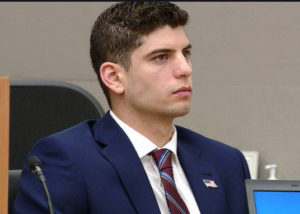
Richard Sepolio’s Testimony About The Crash
Richard Sepolio took the witness stand wearing a navy blue suit with an American flag pinned to his lapel. After talking about growing up in Hamilton, Texas and playing football and running track, he described joining the Navy in June of 2014, where he became an aviation technician working on helicopters. At last, attorney Pfingst moved to the time of the crash.
Sepolio testified he called his girlfriend, Kelly, while leaving Ruiz’s house, and placed the phone in his console on speaker. Although he told an officer after the crash that he was arguing with Kelly, at trial he insisted there had been no argument. On cross examination, prosecutor Bright read a succession of text messages sent from Kelly after the call, in which she stated four times she was sorry, wrote “please don’t hate me,” and asked for another chance. Bright would later tell the jury, “there was something going on,” and also contended Sepolio did not conclude the call before entering the connector road to the bridge as he claimed, but was on the phone much longer, as the first 911 call came 44 seconds after the call ended.
Addressing his speed, Sepolio testified he sped up solely to pass a slower moving vehicle to access the left lane, which from his 90 crossings of the Coronado Bridge was the safest lane for merging purposes. When the driver sped up, blocking his path, he also sped up until he believed he had room to merge. When he realized he did not, he overcorrected, and lost control of his truck. The next thing he remembered was being on top of the barrier, looking down. He did not remember going over or hitting the ground. He came to when the vehicle moved to the side. When asked if he was under the influence, making unsafe lane changes, or driving too fast, he answered, “No sir” to each question.
On cross-examination, Bright immediately brought up his text to Ruiz on the morning of the crash in which he wrote he wanted to “get white girl wasted.” When she asked him what he meant, Sepolio answered, “I wanted to go out to have a good time.” The “white girl wasted” text was a fact pounded home to the jury time and time again and referenced by many of the victim’s families of Sepolio’s intent that day.
To continue reading about what happened in this heartbreaking and riveting trial, please go to Aleida K. Wahn’s book, Murder Trials & Cases That Haunt: Will We Ever Know? Aleida was there inside the courtroom for every minute, and now shares the extraordinary details of what really happened in these gripping and unforgettable trials. Order your copy today at: https://www.amazon.com/dp/B0B31PDDG3
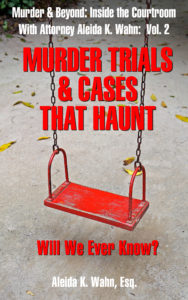
During the trial, I appeared on network news to discuss this case. Here is one of my interviews with KUSI News while the jury was deliberating.
https://www.kusi.com/jury-continues-deliberating-in-trial-of-navy-man-charged-in-fatal-bridge-crash/
About Aleida K. Wahn, Esq.

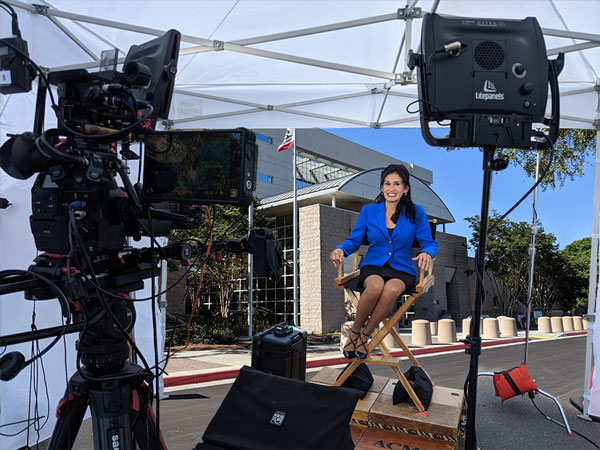
I am an attorney, award-winning true crime writer, and legal analyst of criminal cases. I cover criminal trials and write stories and books about compelling, gripping, and unforgettable cases that impact our world. I take you into the courtroom in high-profile murder trials, rape cases, crimes of passion, cases involving mental illness, deviant behavior, and more. I have a deep passion for true crime, criminal law, and all aspects of the criminal justice system. I have appeared as an expert on true crime shows, including “48 Hours,” “Snapped,” "Peacock TV's Tik Tok Star Murders," and “The Dead Files,” and provided legal analysis on high-profile criminal trials on Court TV, the Law & Crime Trial Network, Fox 5 News, ABC 10 News, and KUSI News. I also create and host shows with the Del Mar Television Producers Group, addressing criminal justice and social issues in recent criminal trials.
I provided my insight and legal analysis on Court TV and the Law & Crime Trial Network of the high-profile trial of former NFL star Kellen Winslow Jr. It was a trial that captured the nation as the heralded ex-football star with fame, fortune, and a famous name stood accused of multiple rapes and other sex crimes involving five women. As the trial delved into shocking facts, complicated legal issues, and unexpected twists and turns, I was there for every minute. After the trial, I wrote a book on the case, going behind the headlines to share the extraordinary details of what happened inside the courtroom. Judging Winslow Jr.: From NFL Star to Serial Rapist? Inside the Shocking Rape Trial of Kellen Boswell Winslow II is now available on Amazon.
I am passionate about telling true crime stories, as these penetrating stories have the power to move us all, while highlighting societal issues which need to be addressed. I have personally seen the human devastation which is present in each trial and believe there is a lesson to be learned in every single case. It is through awareness and examining critical issues society can effect change and even make new laws. To learn more, please visit: https://www.aleidalaw.com.
Read about the gripping and unforgettable trials that I have covered in my latest books:

